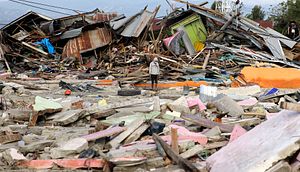A tough call has been made in Central Sulawesi. A fortnight after a magnitude-7.5 earthquake and tsunami hit the province, rescue and relief efforts will now focus on survivors. With 5,000 still missing and a death toll pushing past 2,000, the disaster will be one of the worst of the post-Aceh tsunami era. As the extent of the damage finally becomes well-known, fractures in the response from authorities are apparent.
The Meteorology, Climatology and Geophysics Agency (BMKG) came under immediate fire for its tsunami warning. Critics say the tsunami warning had been withdrawn prior to the first wave hitting the shoreline of Palu, but BMKG maintains the third and final wave made land minutes before the warning ended.
The decision to end the warning was made based on analysis of footage circulating online and reports from the local BMKG office. Agency chief Dwikorita Karnawati, who is now facing calls to resign, says all three waves of the tsunami reached the beach within two and half minutes and finished before the 6.37 p.m. withdrawal of the warning. Karnawati has blamed videos posted to social media after the event as having given the impression the tsunami occurred well after the warning ended.
Likewise, the agency has been condemned for the failure of tsunami sensors to detect the size of the waves. In the weeks since, that criticism has turned toward both central and local governments which have failed to maintain the systems. BMKG spokesman Sutopo Purwonugroho told local media in Jakarta last week that all 22 of the sensors spread across the country are non-operational.
Seismologists have said that the magnitude of natural disasters Indonesia is prone to along the Pacific Rim are extremely difficult to accurately predict. Regardless, widespread reports of petty provincial government budget squabbles preventing adequate funding to maintenance and monitoring is a cruel reality for the 80,000 living under tarpaulin camps.
For a brief moment, it looked as if a serious reckoning would be forthcoming. Banners calling for donations to support relief in Lombok line the streets of cities across the country, looking frayed next to fresh calls for Sulawesi. The popular will for far larger reforms is clear, but political will is already waning. In Jakarta, it’s business as usual. The April elections loom large.
The General Elections Commission (KPU) weighed in quickly as news broke in Sulawesi to warn off candidates, both in the presidential and regional elections, from turning it into a campaign opportunity. The Prabowo Subianto-Sandiaga Uno camp wisely announced it would suspend a previously planned visit to the area from the vice-presidential candidate.
Still, detractors of the incumbent president Widodo derided his two visits to Palu as a violation. It’s unlikely this view is widespread. Polling from LSI, as quoted by Nikkei Asia Review, show that a vast majority of respondents supported his visit to the Lombok sites. Presumably, he receives similar support in the more recent disaster.
Among the development community and internationally, however, Widodo’s credibility has taken a large hit. While his ability to look genuinely presidential among the ruins of Central Sulawesi plays well with voters, it rings hollow after a regulation issued by the disaster mitigation agency (BNBP) demanded foreign aid workers leave the area. Earlier this week, foreign NGOs were told those who had “deployed foreign personnel are advised to retrieve their personnel immediately.” Tim Costello of World Vision told The Guardian the main concern now is that traumatized and overworked local aid workers, many of whom have their own personal connection to the disaster, will stumble.
It’s a curious move for the government to make after a similar decision was widely criticized in the aftermath of Lombok. There, the refusal to deem the devastating earthquake a “national disaster,” and therefore keep out foreign NGOs, had been branded a nationalistic move which has endangered lives on the island. In the months since, overseas experts, particularly engineers, have quietly moved into the province to begin reconstruction. It’s puzzling Jakarta would want to replay those events in Central Sulawesi.
Now with twin disasters on his hands, Widodo risks appearing to put political needs above the genuine needs of Indonesians. Lombok will be considered an emergency — albeit not national — until at least January. Engineering students from Java’s universities have been sent to the island to both support reconstruction and to ensure a well-trained future generation of responders, which will pay off brilliantly in the coming years.
But what about right now? Without help from foreign friends, it is inevitable that resources will be spread thin across both islands. And it won’t be the lawmakers left worse off.
































